The Hindu Editorial (Security in friendship) – May 27, 2022
The recent summit meeting of the leaders of the Quadrilateral Security Dialogue, or Quad, could not have come at a more critical juncture in world politics. For further reading, visit “The Hindu”. Below is today’s word list-1 for The Hindu Editorial (Security in friendship) – May 27, 2022.
To read this article, click “The Hindu”.
This preview is provided here with permission.
Courtesy: The Hindu
The Hindu Editorial (Security in friendship) – May 27, 2022:
- security (noun) – feeling of safety.
- Quad/Quadrilateral (noun) – The ‘Quadrilateral’ is described as four democracies (the United States, Japan, Australia and India) with a shared objective to ensure and support a “free, open and prosperous” Indo-Pacific region.
- summit (noun) – meeting, conference, conclave.
- reshape (verb) – change, alter, transform, remodel.
- alliance (noun) – association, union, partnership.
- architecture (noun) – structure, formation, composition, organization.
- juncture (noun) – point in time, time/moment, stage.
- invasion (noun) – occupation, conquering, capture, seizure, annexation, annexing, takeover.
- destabilise (verb) – undermine, weaken, impair, damage, subvert, sabotage.
- accepted (adjective) – established; well known, recognized, acknowledged.
- norm (noun) – standard, convention, criterion, regulation.
- territorial (adjective) – local; relating to a particular territory (area/region).
- sovereignty (noun) – autonomy, independence, self-government, self-rule, freedom.
- ripple effect/domino effect/knock-on effect (noun) – an event (or a process/action) that causes several other events to happen indirectly one after the other; secondary/indirect effect, consequence/implication, chain of events.
- fuel (verb) – intensify, fan, whip up, stimulate, exacerbate.
- Inflationary/price pressures (noun) – the demand and supply-side pressures that can cause a rise in the general price level; cost-push inflation, hot-economy, deficit finance.
- global value chains (GVC) (noun) – International production, trade and investments are increasingly organised within so-called global value chains (GVCs) where the different stages of the production process are located across different countries. (also known as the global supply chain).
- lingering (adjective) – continuing, remaining, long-lasting, unabating, prolonged, persistent.
- pandemic (noun) – the worldwide spread of a new disease; The illness spreads around the world and typically affects a large number of people across a wide area.
- spotlight (verb) – highlight, underline, underscore; draw/focus attention to.
- deficiency (noun) – insufficiency, shortfall, shortage, deficit.
- public health (noun) – the branch of medicine handling public health; public health is also the science of protecting and improving the health of people and their communities through education, policy making and research for disease and injury prevention.
- infrastructure (noun) – the basic physical or organisational structure or framework that a country or organization needs in order to function properly. For a whole nation, it includes all the physical systems such as buildings, roads & railways networks, utilities, etc.
- multidimensional (adjective) – involving several dimensions (aspects/features).
- agenda (noun) – intention, motive.
- obvious (adjective) – clear, apparent, conspicuous, noticeable, observable, visible.
- explicitly (adverb) – clearly, unequivocally, understandably (without question/doubt).
- strategic (adjective) – relating to achieving long-term or overall goals.
- pose (verb) – constitute, present, create, cause, produce, give rise to (a problem, danger, challenge, or difficulty).
- rules-based (adjective) – based on a predetermined set of principles.
- world/international/global order (noun) – the arrangement of power and authority that provides the system for the conduct of diplomacy and world politics in relation to the entire world.
- blunt (adjective) – straightforward, frank, plain-spoken, candid, direct, to the point, forthright, unequivocal.
- condemnation (noun) – censure, criticism, castigation, stricture.
- belligerence (noun) – hostility, aggressiveness, antagonism, offence; warlike behavior.
- indeed (adverb) – in fact, actually, undeniably.
- on the same page (phrase) – in agreement.
- call for (phrasal verb) – require, publicly ask/necessitate, demand.
- The Indo-Pacific (region) (noun) – the Indo-Pacific region refers to the confluence (convergence) of the Pacific and Indian Oceans, which interconnect in Southeast Asia (Indonesia, Vietnam, Thailand, Philippines, Malaysia, Singapore, and more).
- champion (verb) – advocate, promote, defend, protect, uphold, support, back, espouse.
- adherence (noun) – conformity, observance, observation, accordance.
- international law (noun) – International law defines the legal responsibilities of States in their conduct with each other, and their treatment of individuals within State boundaries. International law’s domain encompasses a wide range of issues of international concern, such as human rights, disarmament, international crime, refugees, migration, problems of nationality, the treatment of prisoners, the use of force, and the conduct of war, among others. International law also regulates the global commons, such as the environment and sustainable development, international waters, outer space, global communications and world trade.
- reflect (verb) – indicate, show, display, demonstrate, disclose.
- United Nations Convention on the Law of the Sea (UNCLOS) (noun) – This convention provides the overarching framework for the governance of the oceans. It governs relations among countries on ocean-related issues. It outlines the rights and responsibilities countries have related to the use of the oceans, the seabed and their resources, and the protection of the ocean environment. This Convention was signed on 10 December 1982 and entered into force on 16 November 1994.
- navigation (noun) – the planned movement of a ship/boat on the water.
- overflight (noun) – a passage of an aircraft over a particular area.
- maritime (adjective) – of or related to the sea.
- affirm (verb) – declare, state, assert emphatically/publicly.
- Dialogue (noun) – The Quadrilateral Security Dialogue, colloquially the Quad, is a strategic security dialogue between Australia, India, Japan, and the United States that is maintained by talks between member countries.
- coercive (adjective) – overbearing, forceful, intimidating, high-handed.
- provocative (adjective) – annoying, irritating, agitational, provoking, inflammatory.
- unilateral (adjective) – relating to a method of taking decisions (particularly on international relations) by a state (country) individually without considering other states (countries). In general, it is relating to the decision taken individually without consulting with the others concerned.
- seek (verb) – try, aim, attempt; ask for, appeal to, demand.
- status quo (noun) – the present situation, the current state, the existing state of affairs.
- heighten (verb) – increase, intensify, amplify, add to.
- tension (noun) – strained relations, strain, unease; ill feeling, friction, antagonism, antipathy, hostility, enmity
- manoeuvre (noun) – activity, plan/operation, stratagem, tactic (carefully planned).
- militarisation (noun) – the act of making something similar to armed forces. the process of equipping something (an organisation/etc) with military forces/resources.
- Coast Guard (noun) – a maritime security organization of a particular country.
- vessel (noun) – ship, yacht, boat.
- militia (noun) – armed forces, military unit, insurgent, rebel (that involves in rebel/terrorist activities against the main/regular forces).
- clandestine (adjective) – secret, surreptitious, covert, stealthy, conspiratorial, concealed, hidden.
- offshore (noun) – a process of registering a business (or department) at foreign country to take advantage of lower taxes or less regulations.
- offshore (adjective) – registered/situated at foreign country to take advantage of lower taxes or less regulation.
- exploitation (noun) – utilization, use, making use of, making the most of, capitalization on; taking advantage.
- to that/this end (phrase) – for that reason.
- depth (noun) – intensity, strength.
- mission (noun) – aim, goal, purpose, objective, target.
- notably (adverb) – significantly, importantly, crucially.
- exercise (noun) – manoeuvres, operations.
- Malabar Exercise (noun) – It is a multilateral naval exercise that includes simulated war games and combat manoeuvres. It started in 1992 as a bilateral exercise between the Indian and US navies. Japan joined in 2015.
- leverage (verb) – use or utilize something to maximum advantage.
- supply chain (noun) – a dynamic network when a company purchases or uses goods or services from others. It involves people, information, processes, and resources involved in the production, handling, and distribution of materials and finished products or providing a service to the customer.
- resilience (noun) – the ability to bounce back quickly from difficulties; strength of character, strength, toughness.
- cybersecurity (noun) – the protection of internet-connected systems, including hardware, software, and data from cyber attacks.
- North Atlantic Treaty Organization (NATO) (noun) – NATO was created in 1949 by the United States, Canada, and several Western European nations to provide collective security against the Soviet Union.
- pushback (noun) – resistance, opposition, force back, repulse drive.
- hegemonic (adjective) – dominant, commanding, authoritative.
- liberal (adjective) – unprejudiced, unbigoted, broad-minded, open-minded.
- consensus (noun) – an idea or opinion that is shared by all the people in a group, agreement, concurrence.
- globalisation (noun) – the process of making the trade of goods and services equivalent in all nations (Courtesy: VOA Learning English).
- run its course (phrase) – come to an end, cease to exist, fade away, vanish, peter out, draw to a close, disappear, finish, end, cease, terminate.
- appetite (noun) – hunger, strong desire, liking.
- deepen (verb) – grow, increase, intensify.
- context (noun) – circumstances, conditions.
- pole position (noun) – advantage, dvantageous position, favourable position, the upper hand.
- realpolitik (noun) – realistic and practical politics (German word).
Note:
1. Click each one of the words above for their definition, more synonyms, pronunciation, example sentences, phrases, derivatives, origin and etc from http://www.oxforddictionaries.com/.
2. Definitions (elementary level) & Synonyms provided for the words above are my personal work and not that of Oxford University Press. Tentative definitions/meanings are provided for study purpose only and they may vary in a different context.
3. This word list is for personal use only. Reproduction in any format and/or Commercial use of it is/are strictly prohibited.
The Hindu Editorial (Security in friendship) – May 27, 2022:
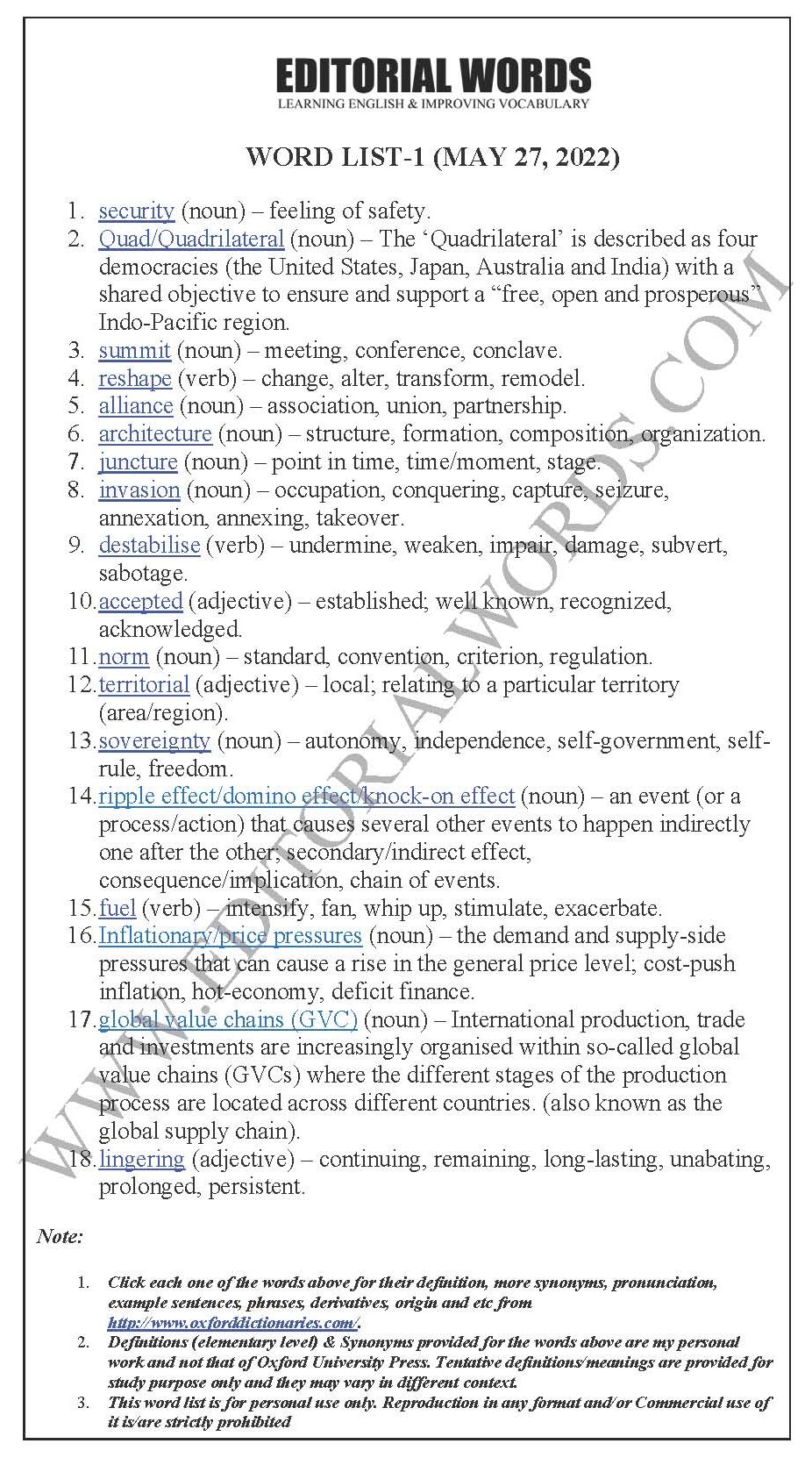
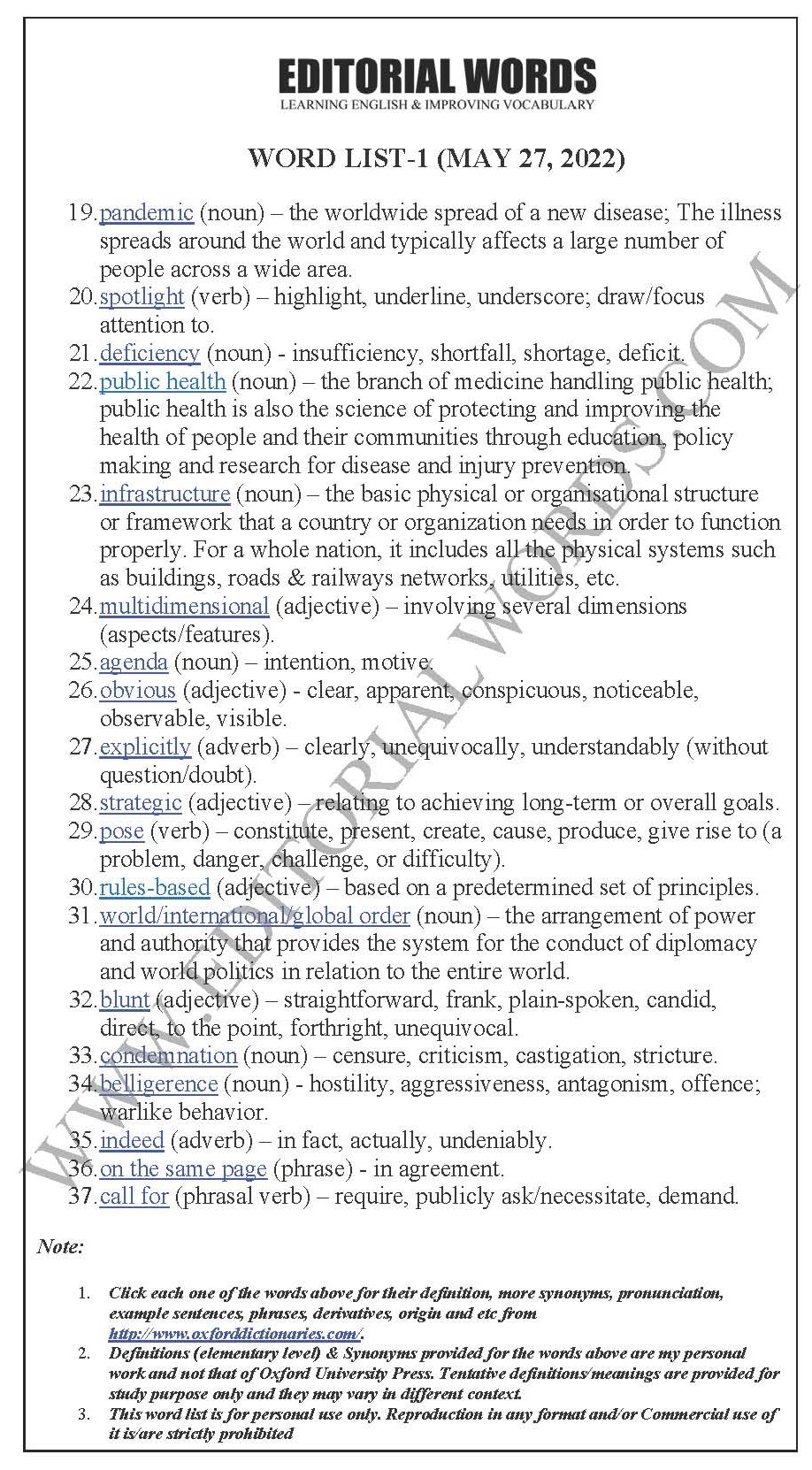
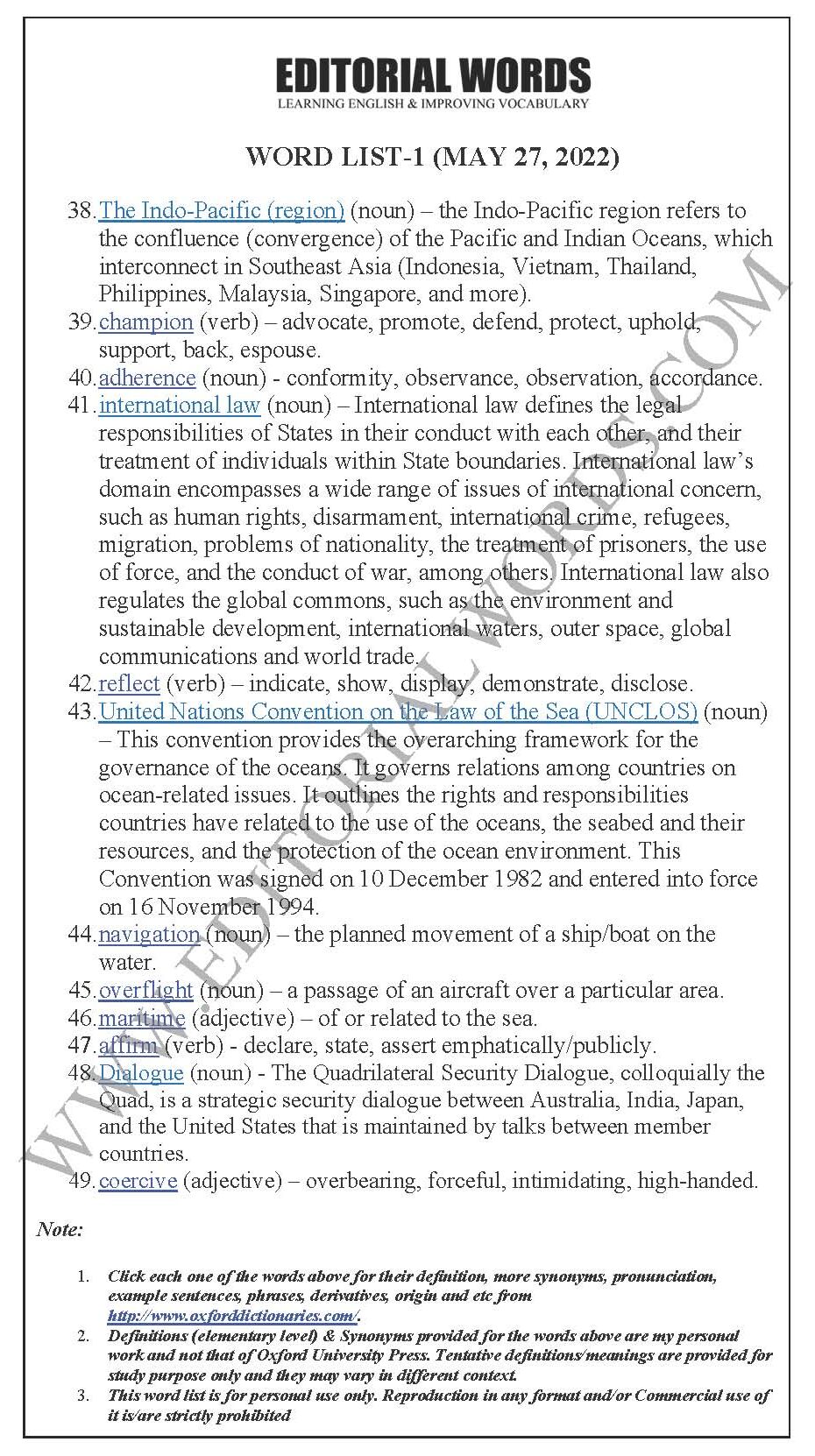
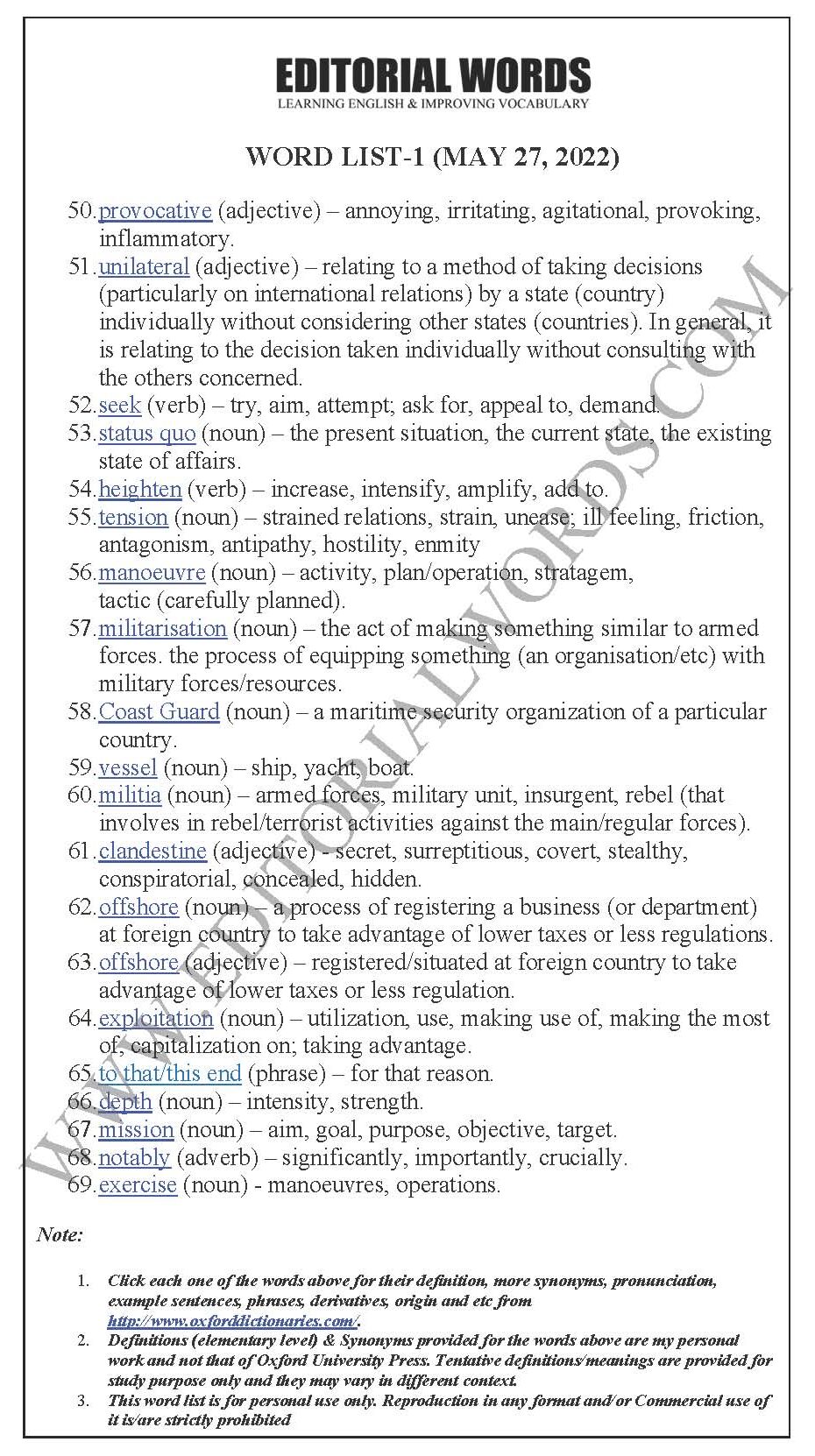
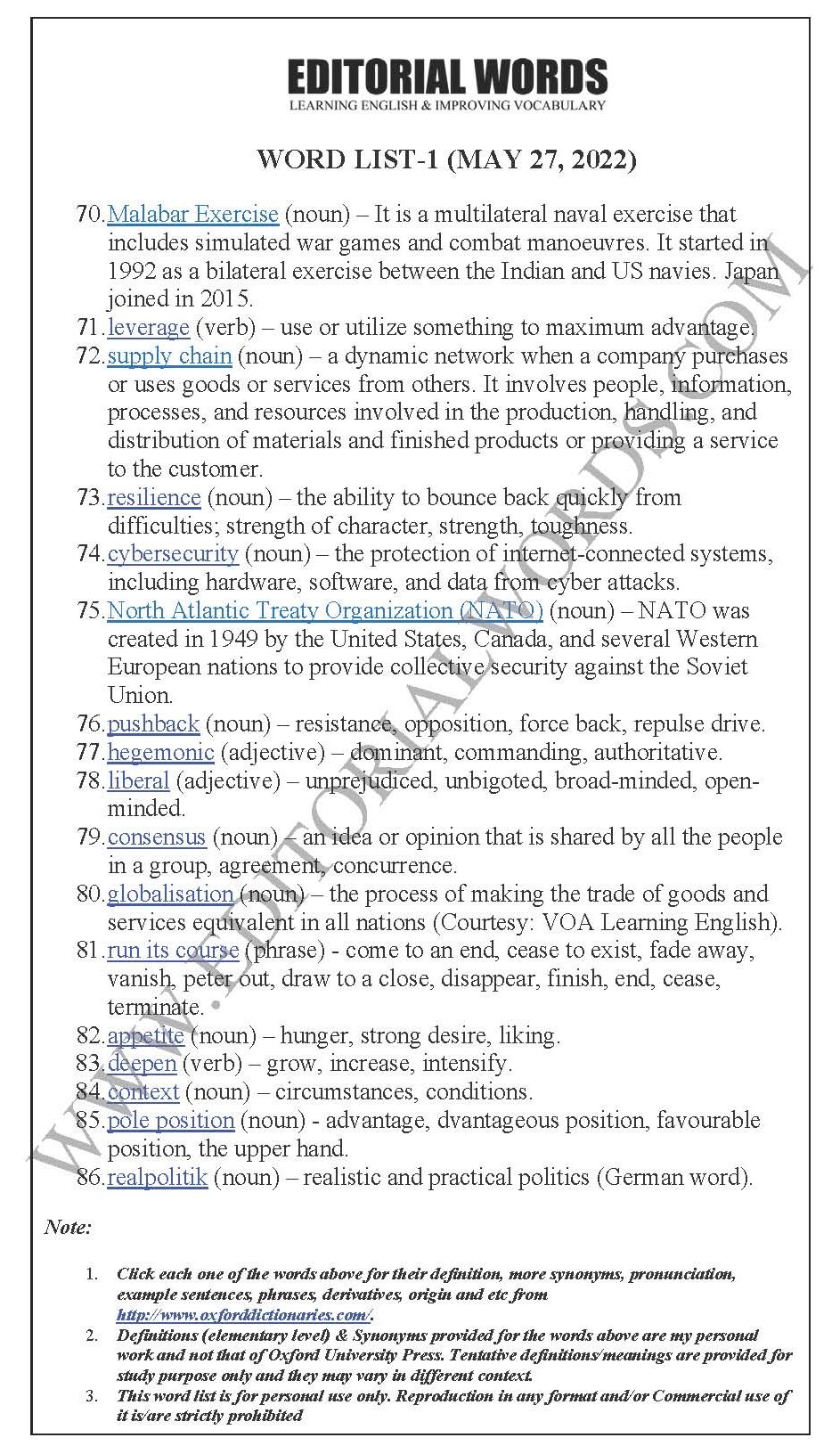
“Phrasal Verbs” We Learnt Last Week
“Idioms & Phrases” We Learnt Last Week
“Important Definitions” We Learnt Last Week
Recent Word Lists For The Hindu Editorial Articles

Be the first to comment